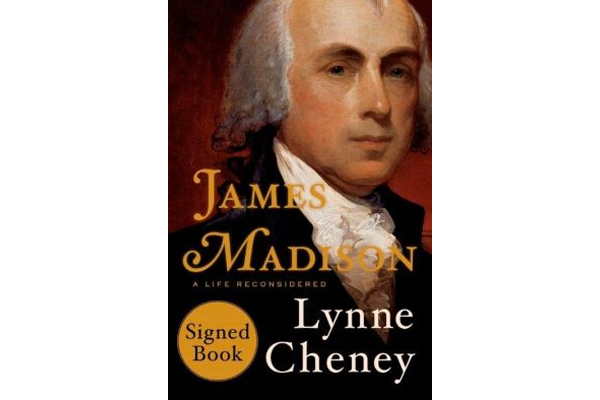Cheney on Madison

Lynne Cheney’s eighth book is a biography of James Madison, founding father, leading architect of the Constitution, a principle author of the Federalist Papers, Thomas Jefferson’s Secretary of State, and America’s fourth president. Such a life deserves periodic review and has gotten it, beginning with a eulogistic biography, “Life and Character of James Madison,” written upon his death in 1836 by his sometime political rival John Quincy Adams. There have been a number of books on Madison in this young century.
Cheney posits at the outset of "James Madison: A Life Reconsidered" that the luster of her subject’s many accomplishments has faded over time or been tarnished by the likes of Henry Adams (grandson of John Quincy Adams), who in 1891 penned a critical history of Jefferson’s and Madison’s back-to-back administrations. Cheney writes, “his fine reputation would suffer, and he is popularly regarded today – when remembered at all – less as a bold thinker and superb politician than as a shy and sickly scholar”.
Upon this premise, Cheney proclaims her intention to give Madison his props. She forthwith proclaims him to be a genius – the equivalent in politics to Einstein in science or Mozart in music and “one of the great lawgivers of the world.” Following such hyperventilation, she settles down to do the heavy lifting in yeoman-like fashion: recounting his life and times in a detailed, well-researched, and mostly engaging narrative. Without question, getting to know James Madison better is a good thing.
Madison was, indeed, a scholar, a deep political thinker, and a consummate politician. He also was a gifted writer who was instrumental in crafting the Constitution of the United States and getting the not-so-united states, with their diverse interests, to make it the law of the land. Without Madison, it is not clear that this bedrock foundation of our republic would have been put properly in place. It is interesting to note, however, that the very people who drafted and approved this marvelous document soon would be disagreeing on what their “original intent” had been. Go figure.
For example, Madison believed that because the Constitution didn’t specify that the federal government could do certain things, such as build canals or charter a national bank, those specific activities should be prohibited until such time as the document was amended. Others thought this to be a narrow interpretation – that such matters were permitted under the clause empowering the government to provide for the nation’s “general welfare.” Nonetheless, when it came time for Jefferson to purchase the Louisiana Territory, Madison convinced the president that the absence of a territorial acquisition article in the Constitution shouldn’t stand in the way of a good deal.
Cheney takes the reader through the twists and turns of a young nation with growing pains, the rise of parties and partisanship, and Madison’s evolving political thought. She empathizes with her subject throughout, whether he is acting like a founding father or more like a garden-variety politician.
In the 1780s, Madison worried that the states needed to be reined in and proposed that the federal government have the extraordinary power to veto state laws; but by the 1790s, he felt that it was the federal government that had gained the upper hand and proffered that states had the right to resist federal laws which they deemed unconstitutional. In response to the Alien and Sedition Acts, Madison and Jefferson co-wrote the Virginia Resolution of 1798, which asserted that states had the right to “interpose” with what they deemed an unwarranted federal law. That word was seen by some as a euphemism for the divisive term “nullify,” which would crop up later on. Many felt that it was the job of the US Supreme Court to rule on the constitutionality the nation’s laws.
Madison was against a national bank until he became president. He also had long been wary of establishing a strong military but would launch the nation’s first post-Revolution war. Madison hated slavery philosophically, Cheney writes, but she dutifully recounts that the lifelong slaveholder left the 100 or so enslaved people at Montpelier to his widow Dolly in his will. The reality was that Madison, the embodiment of that modern slur "a career politician," did not earn his own keep, living off his father and then his father’s estate, which he inherited in 1801, in his 50th year. Slaves were indispensable to the continued wellbeing of Madison and his family. Necessity trumped theory.
The reader learns such things from Cheney but they don’t impair her determined canticle to Madison. If he was a genius at times, he could be dead wrong, too; but the author doesn’t linger on his failings. Few would argue, however, with her contention that Madison played “a key role – the key role, one might say – in creating a framework for laws and establishing institutions that would secure liberty and happiness for generations to come.”